As we emerge from lockdown, millions of Canadians won’t have jobs to go back to. Many will not see their incomes recover to what they were before. Like previous recessions, there will be fewer middle-class and more low-pay jobs, and the end of CERB will leave millions of Canadians worse off.
Canadians don't have much time: 4 in 10 recent layoffs could be permanent, and it could take more than a decade to recover. Meanwhile, 8 in 10 Canadians have 3 months of savings or less. As consumer spending drives nearly 2/3 of our economy, many businesses will continue to suffer for years.
We urge the Government of Canada to implement Recovery UBI, a permanent $500/month universal dividend, which increases to guarantee each individual an income of $2,000/month ($3,000 per couple and $1,500 per additional adult in the family). It will give all Canadians a raise while supporting businesses and creating jobs immediately.
Companies have not only laid off workers—many have permanently closed. Businesses that survive must do so by replacing good paying jobs with software and hardware automation.
Previous economic recoveries have been highly polarized in ways that are un-Canadian, wiping out middle-class jobs and pushing more Canadians into low-income jobs. This time, businesses are accelerating their investments into automation, which can already replace 4 in 10 tasks Canadians do at work today.
Technology enables wealth to be created with less human work, decreasing the share of that wealth that ends up as income for working Canadians. As a result, the past 40 years of growth in the economy has gone mostly to the highest earners.
But this, time we can do better.
Recovery UBI recognizes that jobs aren't working for most people. Canadians are working harder and longer than the last generation, and getting less in return. Incomes are not keeping up with costs of living, because technology is cheaper than workers. Technology is slicing the traditional job into gig and part-time jobs with no benefits and no security.
Recovery UBI addresses these trends by giving each of us a share of our economy, a basis for shared prosperity as we experience rapid and disruptive automation. It buys us time by keeping us out of poverty, so we can retrain and develop our skills as we transition to the jobs of tomorrow.
UBI is not social assistance. It is not a handout or a form of charity. It is how Canadians across the country can reclaim their slice of the economic pie. UBI is how we defend upward mobility and pathways into the middle-class for everyone.
Recovery UBI is an important foundation for a future of abundance and opportunity for all. It is how we plant the seeds for new jobs and new businesses to be created as we emerge from this crisis. It ensures all Canadians can play a part in our nation's recovery.
We call on the Government of Canada and all opposition parties to support a better and faster post-pandemic economic recovery by implementing a Recovery Universal Basic Income upon which Canadians can build better incomes, better careers, and better businesses.
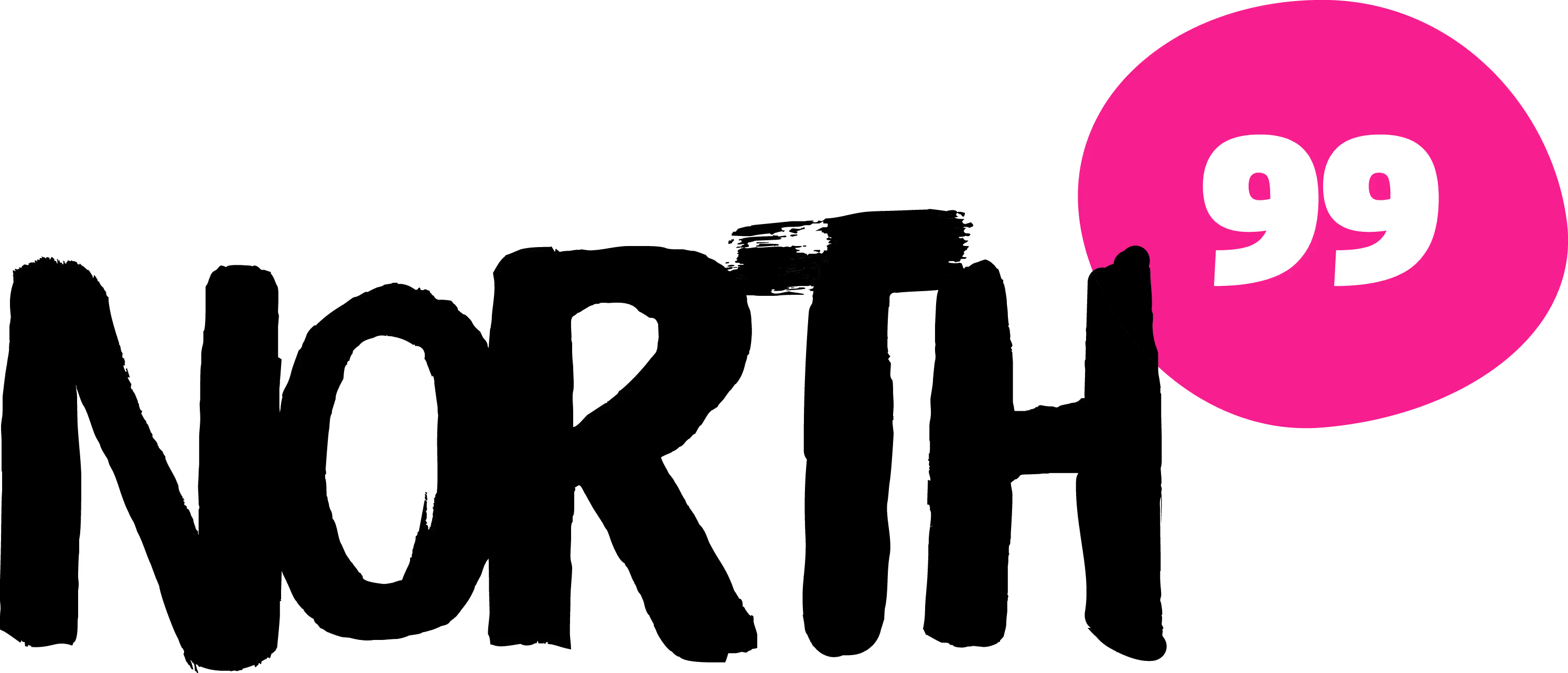
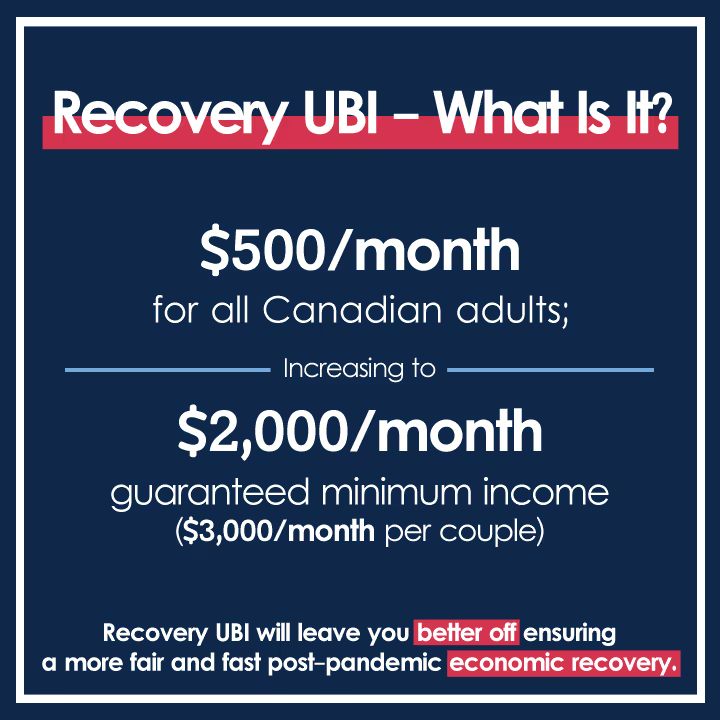
Recovery UBI is a $500/month non-taxable payment to every adult (known as a universal dividend), which increases to guarantee each individual an income of a $2,000/month (the guaranteed minimum income, or GMI) for those who need it the most—so that every Canadian makes at least $24,000/year.
In families with multiple adults receiving Recovery UBI, each adult gets a guaranteed minimum income of $1,500/month, or $18,000/year. This means, for instance, that a couple would be guaranteed $3,000/month ($36,000/year) and a couple with an elderly parent living with them would be guaranteed $4,500/month ($54,000/year).

If you're one of 8 million Canadians on the CERB, Recovery UBI will buy you the time you need to find opportunity in a post-pandemic economy. Recovery to pre-pandemic levels is predicted to take as much as 10 years. If you are among the 4 in 10 recent layoffs expected NOT to be hired back, adopting this program is urgent.
UBI is affordable.
It's merely a matter of political will.
UBI Works has put together 8 different options to pay for Recovery UBI. It is fully possible to pay for a basic income without raising personal income taxes, without eliminating social programs, and without adding to the national debt.
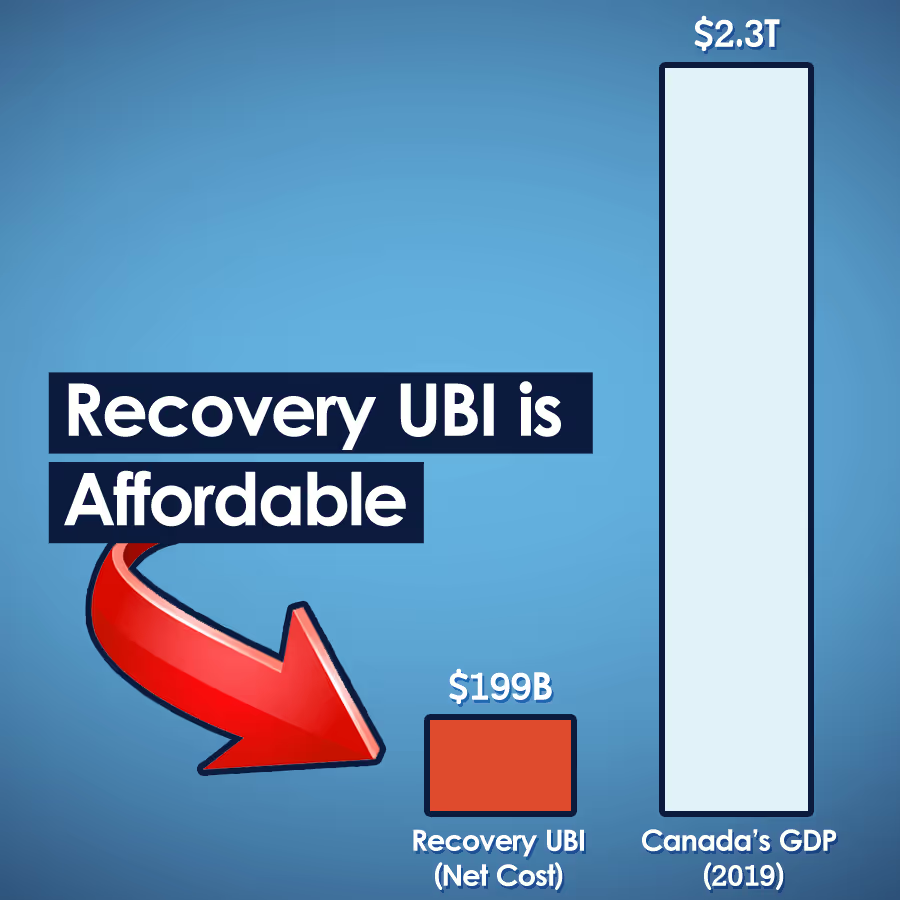
These 8 funding plans are drawn from a list of $874B in funding proposals collected from ideas across the political spectrum. Basic Income isn’t left or right, if we choose the right way to pay for it.
A universal dividend (UBI) gives you a share of the economy, letting us share in the value that technology is creating, while a guaranteed minimum income (GMI) buys you time by keeping you out of poverty, as you transition into the new economy. Recovery UBI delivers BOTH, and this article explains why.
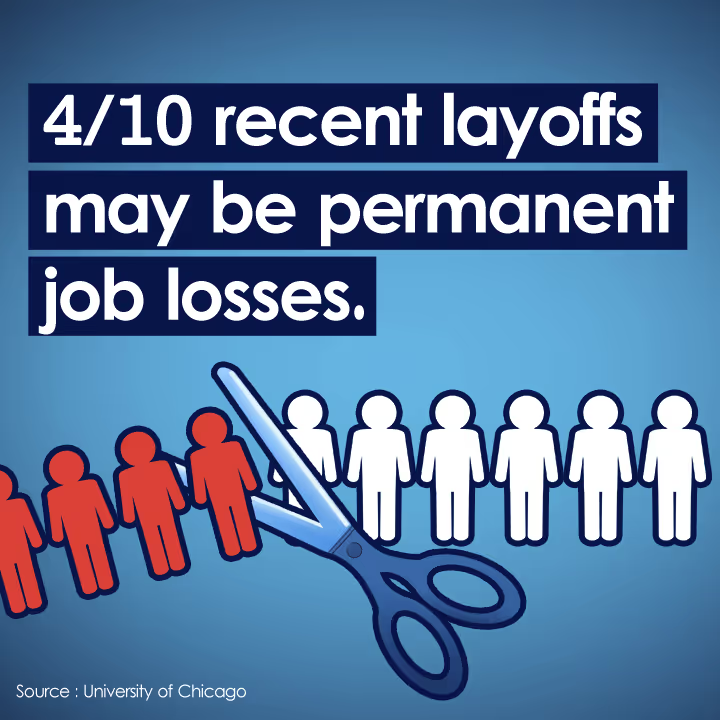
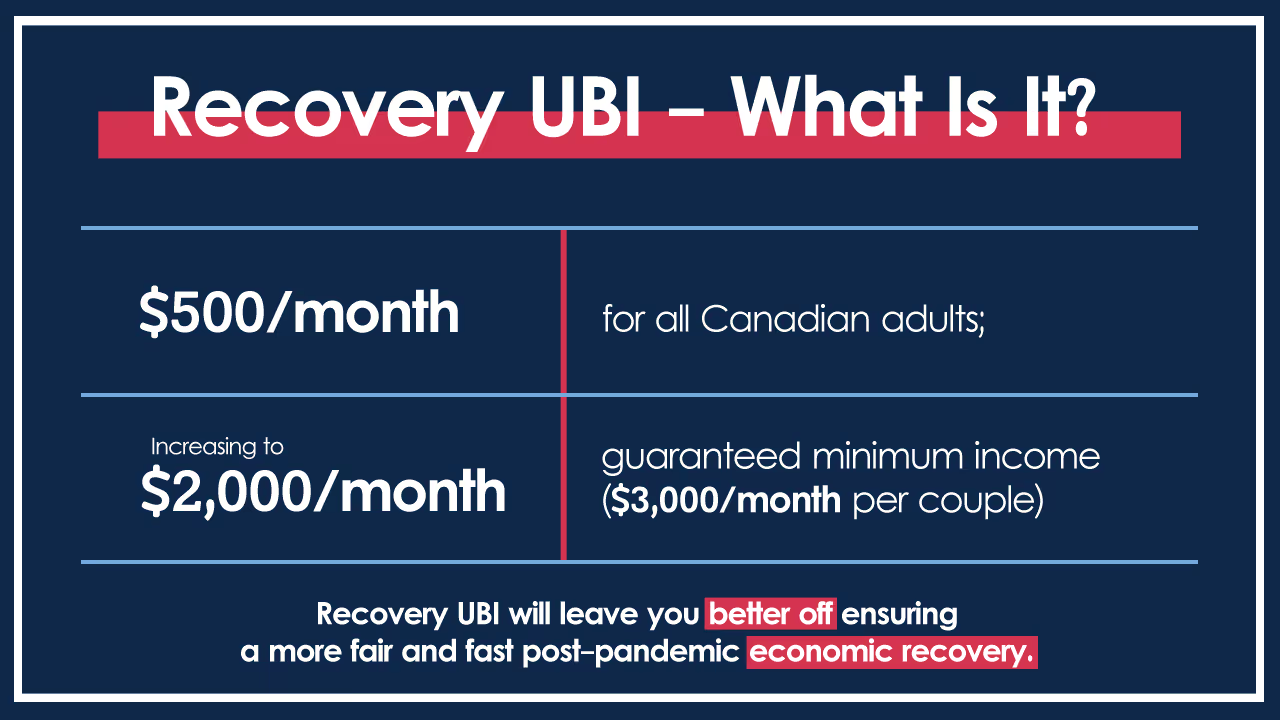
Recovery UBI is a $500/month non-taxable payment to every adult (known as a universal dividend), which increases to guarantee each individual an income of a $2,000/month (the guaranteed minimum income, or GMI) for those who need it the most—so that every Canadian makes at least $24,000/year.
In families with multiple adults receiving Recovery UBI, each adult gets a guaranteed minimum income of $1,500/month, or $18,000/year. This means, for instance, that a couple would be guaranteed $3,000/month ($36,000/year) and a couple with an elderly parent living with them would be guaranteed $4,500/month ($54,000/year).

If you're one of more than 8 million Canadians on the CERB, Recovery UBI will buy you the time you need to find opportunity in a post-pandemic economy. Recovery to pre-pandemic levels is predicted to take as long as 10 years. If you are among the 4 in 10 recent layoffs expected NOT to be hired back, adopting this program is urgent.
UBI is affordable—it's merely a matter of political will.

UBI Works has put together 8 different options to pay for Recovery UBI. It is fully possible to pay for a basic income without raising personal income taxes, without eliminating social programs, and without adding to the national debt.
These 8 funding plans are drawn from a list of $874B in funding proposals collected from ideas right across the political spectrum that could pay for the entire program 3 times over. Basic Income isn’t left or right, if we choose the right way to pay for it.
A universal dividend (UBI) gives you a share of the economy, letting us share in the value that technology is creating, while a guaranteed minimum income (GMI) buys you time by keeping you out of poverty, as you transition into the new economy. Recovery UBI delivers BOTH, and this article explains why.
Our economy is leaving most Canadians worse off. Jobs aren't working for most people, because wages are not growing faster than costs of living. A key reason for this is that technology is cheaper than workers. We are in the fourth industrial revolution, and the job and wage displacement is accelerating.
We can fix this—and reclaim our prosperity—with Recovery UBI. If we don't do this now, Canada's recovery will leave most of us worse off—just like previous recoveries. Recovery UBI is how we ensure a fairer and faster recovery for all.

An entrepreneur driving an Uber part-time making $28,000 while building their business would benefit from a 35% effective raise to $38,000 a year. Entrepreneurs could choose to live off $2,000/month with no market income as they build their startups. This is why Y Combinator's Sam Altman calls UBI "seed funding for the people".
Students not receiving an income could focus on school with the full $24,000 income guarantee, improving educational outcomes and increasing graduation rates.
Seniors receive a guaranteed minimum income of $24,000/year ($36,000 per couple), higher than what is guaranteed by OAS/GIS. Therefore the GMI would top up existing payments (CPP, OAS, GIS, etc.) to at least $24,000.
This is income you can build off should you wish to continue working or make other contributions to your community.
Recovery UBI can be rolled out quickly, on top of other needs-based supports, so the most vulnerable Canadians are not worse off. Those receiving government benefits receive an immediate $500/month unconditionally, and if they are still below $2,000/month ($3,000 for couples), are topped up, while they will always make more if there is work income.
Canadians with disabilities have long had to survive on government assistance levels far below their cost of living, resulting in much higher poverty rates. The programs that do support them are vital, and small changes can have catastrophic effects for those relying on them to meet their daily needs.
That’s why Recovery UBI doesn’t touch or tweak any existing disability support program—the cost of making a mistake is just too high. Instead, Recovery UBI adds between $6,000-$24,000/year immediately to the incomes of those living with disabilities. The $24,000 floor nearly doubles the effective maximum amounts that federal and provincial programs provide.
An entrepreneur driving an Uber part-time making $28,000 while building their business would benefit from a 35% effective raise to $38,000 a year. Entrepreneurs could choose to live off $2,000/month with no market income as they build their startups. This is why Y Combinator's Sam Altman calls UBI "seed funding for the people".
Students not receiving an income could focus on school with the full $24,000 income guarantee, improving educational outcomes and increasing graduation rates.
Seniors receive a guaranteed minimum income of $24,000/year ($36,000 per couple), higher than what is guaranteed by OAS/GIS. This is an income you can build off, should you want to continue working or making other contributions to your community.
Recovery UBI can be rolled out quickly, on top of other needs-based supports, so the most vulnerable Canadians are not worse off. Those receiving government benefits receive an immediate $500/month unconditionally, and if they are still below $2,000/month ($3,000 for couples), are topped up, while they will always make more if there is work income.
Canadians with disabilities have long had to survive on government assistance levels far below their cost of living, resulting in much higher poverty rates. The programs that do support them are vital, and small changes can have catastrophic effects for those relying on them to meet their daily needs.
That’s why Recovery UBI doesn’t touch or tweak any existing disability support program—the cost of making a mistake is just too high. Instead, Recovery UBI adds between $6,000-$24,000/year immediately to the incomes of those living with disabilities. The $24,000 floor nearly doubles the effective maximum amounts that federal and provincial programs provide.
Hover your mouse over the graph to see a detailed breakdown of "total income". Click here to save them to your device.
Tap on the graphs to switch between simple and detailed views of "total income". Swipe to see impact on 2-adult families. Tap here to save them to your device.
Under our plan, all Canadians get a universal dividend (blue part of the chart above), and a guaranteed minimum income (red part of chart) that is gradually phased out as Canadians earn income from work.
Individuals are guaranteed a minimum income of $2,000/month ($24,000/year; $36,000 per couple and $18,000 per additional adult), which is gradually phased out by 50 cents for every dollar of work income, and by $1 for every dollar of government benefits or investment income—to a minimum Recovery UBI of $500/month, the universal dividend for all Canadians. This ensures Canadians are always making more if they are working, while ending working poverty. Regardless of income, everyone receives a $500/month universal dividend unconditionally.
Every Canadian adult gets $500/month immediately, which increases to guarantee all Canadians a minimum income of $2,000/month ($3,000 per couple, and $1,500 per additional adult in the family) based on your existing income.
This minimum income, or income floor, ensures that your total income, including existing government cash supports, the universal dividend, and all other income combined, is no less than $2,000/month ($1,500 for those residing with family members also receiving it).
The monthly amount will rise if your income falls below $2,000, offsetting the risk of losing income during the pandemic, such as getting laid off.
You will always make more if you earn money from work.
Recovery UBI only counts 50% of your employment income against the $2,000 guarantee. This ensures that at every income level, the choice to work will still earn you more money. For every dollar earned through employment, the income guarantee payment will only decrease by $0.50.
If you are making enough that you don’t require the income guarantee, you still get an extra $500/month.

Many basic income proposals aim to replace the current social assistance programs with a single, more generous and efficient program. These require complicated negotiations between all levels of government to ensure the many millions of Canadians that rely on current programs are not negatively impacted.
Recovery UBI is designed to be a quicker, cheaper solution for the context of the current pandemic, while still allowing for a transition to a permanent arrangement between the governments. Because it does not require consolidating dozens of provincial and federal programs, Recovery UBI is much cheaper than a single, all-encompassing basic income, and something the federal government can roll out quickly and affordably to give all Canadians immediate relief.
After Recovery UBI is rolled out, we envision the universal dividend to increase each year until everyone receives the same amount - a true universal and unconditional basic income for all Canadians.
Find out why Recovery UBI is affordable.
As businesses reopen and Canadians go back to work, Recovery UBI gives all Canadians the ability to be customers, supporting local businesses and driving job creation. It puts money directly into the hands of Canadians, who spend it right back into their communities.
We know UBI works to create jobs and help businesses - the proof is already visible within our families. The Canada Child Benefit is Canada's national Basic Income for people with children, received by 67% of Canadian families.


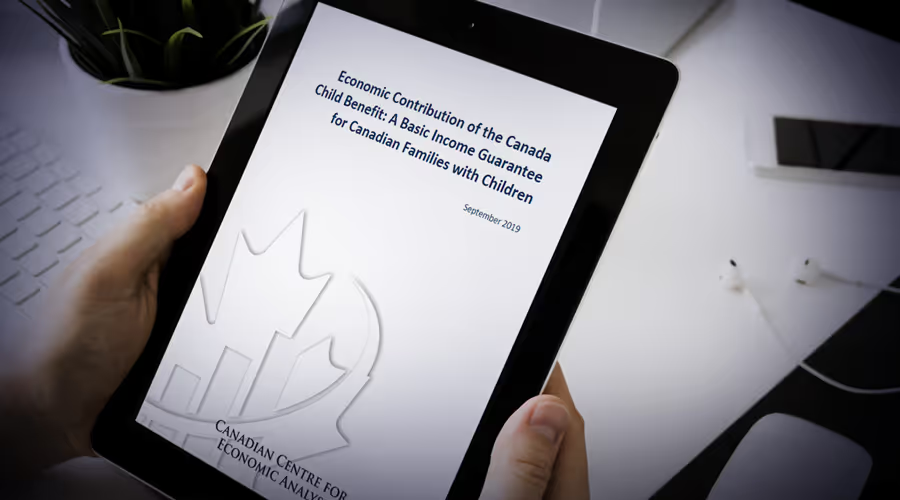
UBI Works commissioned a study on the Canada Child Benefit, a basic income for families, showing that basic income is growing the economy, creating jobs, and lifting Canadians out of poverty.
Read more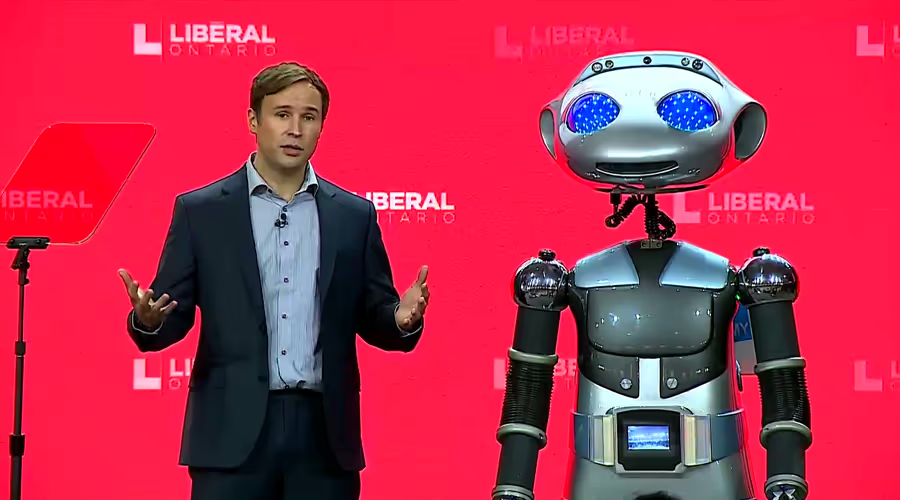
On March 7, 2020 UBI Works founder, Floyd Marinescu spoke to more than 2,000 politicos, including former Premiers of Ontario, MPs, and MPPs about automation and the urgency for UBI
Watch Video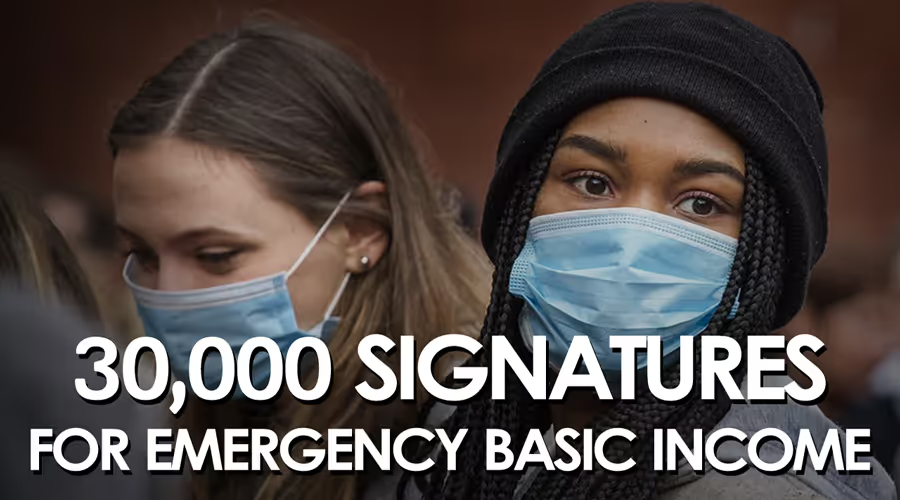
On March 16, 2020, UBI Works launched a petition for an Emergency UBI, garnering over 30,000 signatures and emails to all 338 MPs.
See the Petition